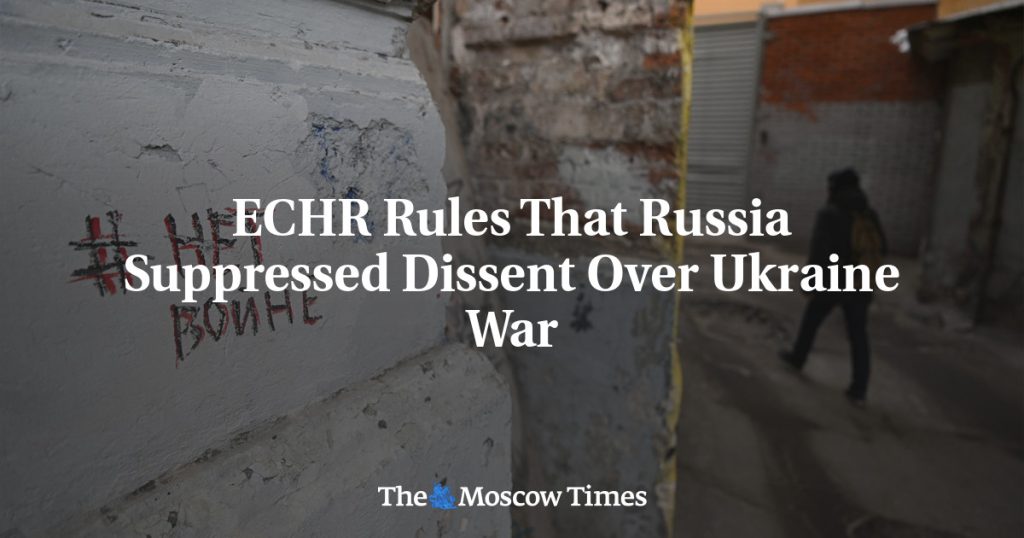The European Court of Human Rights Condemns Russia’s Suppression of Dissent
The European Court of Human Rights (ECHR) delivered a landmark ruling on Tuesday, condemning Russia for its systematic efforts to suppress dissent and freedom of expression following the full-scale invasion of Ukraine. The Strasbourg-based court found that Russian authorities had imposed severe restrictions on independent media outlets, effectively silencing any voices that contradicted the official narrative about the invasion. This coordinated crackdown on free speech has led to the exile of dozens of independent media organizations, which were forced to restart their operations abroad after draconian legislation criminalized public criticism of the war.
The Exodus of Independent Media: A Blow to Free Press
The ECHR’s ruling comes in response to complaints filed by prominent independent Russian media outlets, including Novaya Gazeta and TV Rain, as well as individual applicants. These organizations were among the many that faced unprecedented censorship and legal harassment following Russia’s invasion of Ukraine in February 2022. Under new laws, the use of the word "war" itself was banned in publications and broadcasts, forcing media outlets to either comply with the restrictions or face severe consequences. As a result, numerous independent media organizations were compelled to leave the country to continue their work, marking a dark chapter in Russia’s already troubled history of press freedom.
A Violation of Fundamental Human Rights
The ECHR explicitly stated that Russia’s restrictions on free expression violated Article 10 of the European Convention on Human Rights, which protects the right to impart and receive information without interference from public authorities. The court noted that these measures were not aimed at addressing any legitimate national security concerns but rather constituted "a coordinated effort to suppress dissent." Russian national courts, the ECHR observed, had criminalized any reporting or statements that deviated from the Kremlin’s preferred terminology, referring to the invasion as a "special military operation." This approach, the court argued, failed to balance the competing interests at stake, particularly the public’s right to be informed about matters of crucial importance, such as an armed conflict and allegations of war crimes.
The Bigger Picture: A Crisis for Civil Society
The ECHR’s ruling sheds light on the broader crisis facing Russian civil society under President Vladimir Putin’s regime. Since the invasion of Ukraine, independent media, human rights organizations, and dissenting voices have faced unprecedented repression. The forced closure of media outlets and the exile of journalists have left a vacuum, with the Russian public increasingly reliant on state-controlled narratives. This has had far-reaching consequences, not only for press freedom but also for the rule of law and democratic accountability in Russia. The ECHR’s ruling is a rare instance of international accountability for these actions, though it remains to be seen whether it will lead to any meaningful change on the ground.
Russia’s Defiance and the Erosion of International Institutions
The ECHR’s ruling also highlights the challenges faced by international institutions in holding Russia accountable for its actions. Following Russia’s invasion of Ukraine, the country was expelled from the Council of Europe, the organization that oversees the European Convention on Human Rights. Russia subsequently withdrew from the convention in September 2022, marking a significant erosion of its commitments to human rights and the rule of law. However, the ECHR retains jurisdiction over cases brought against Russia before its withdrawal, ensuring that some mechanism for accountability remains in place. Despite this, the court’s ruling is unlikely to have any practical impact in Russia, where authorities have shown disregard for international legal frameworks.
A Call to Action: Supporting Independent Journalism
In the face of this systemic repression, the importance of independent journalism cannot be overstated. Organizations like The Moscow Times, which continue to provide unbiased reporting despite immense challenges, play a vital role in counteracting state propaganda and ensuring that the public remains informed. However, their work is under constant threat, with legal harassment, financial pressures, and personal risks to journalists making it increasingly difficult to operate. Readers and supporters around the world are being called upon to stand in solidarity with these brave journalists by providing financial and moral support. In doing so, they are not only defending press freedom in Russia but also upholding the principles of democracy and human rights that are under siege in one of the world’s most authoritarian regimes. By supporting independent journalism, we are reminding the world that even in the darkest of times, the truth has the power to inspire change.












